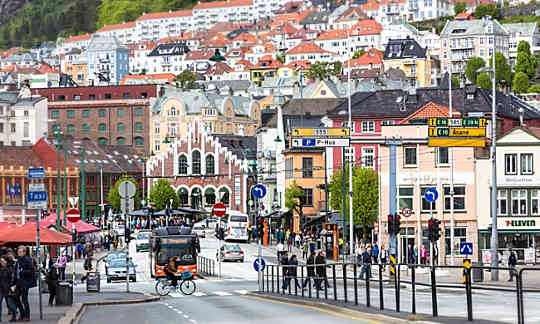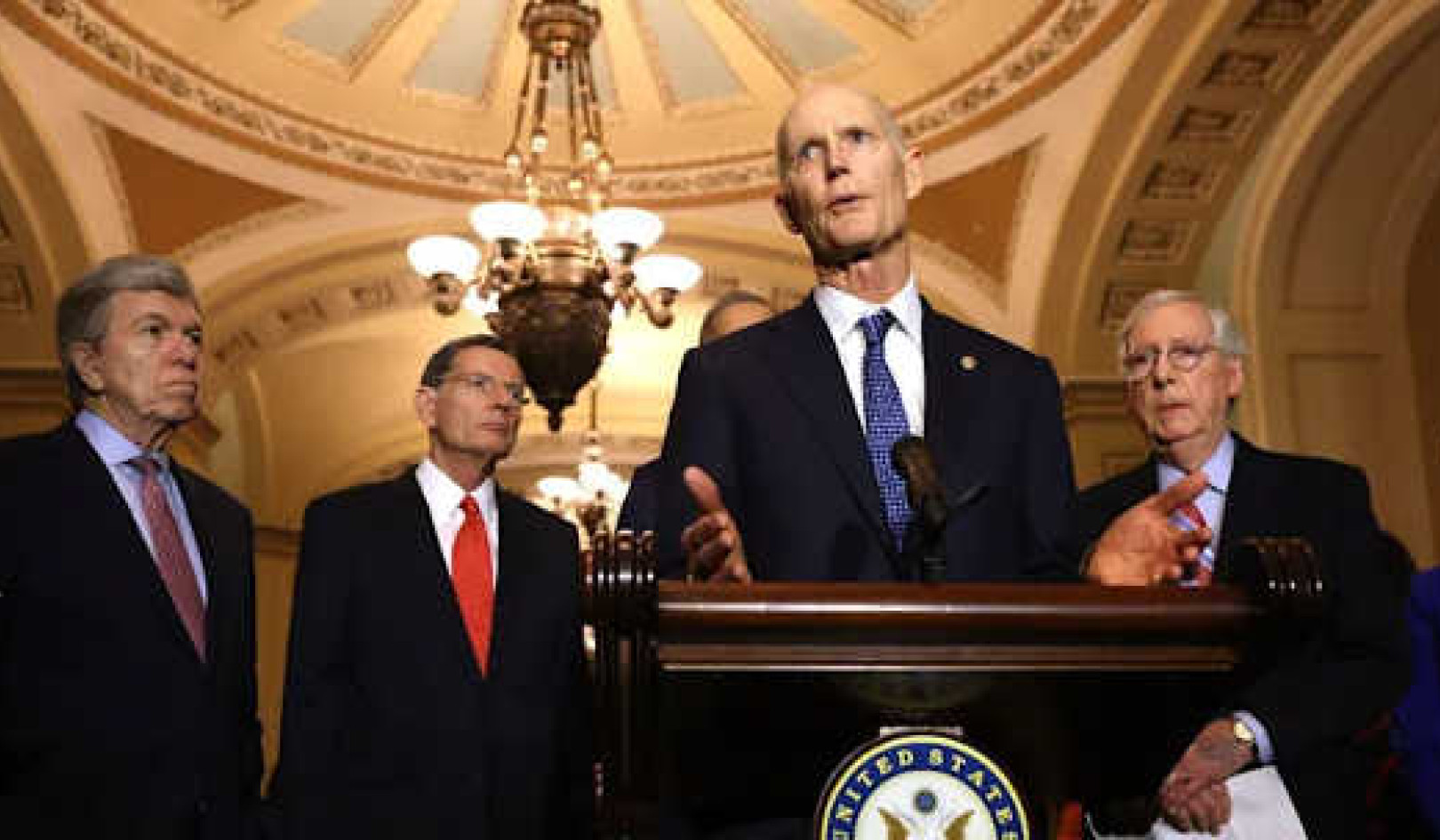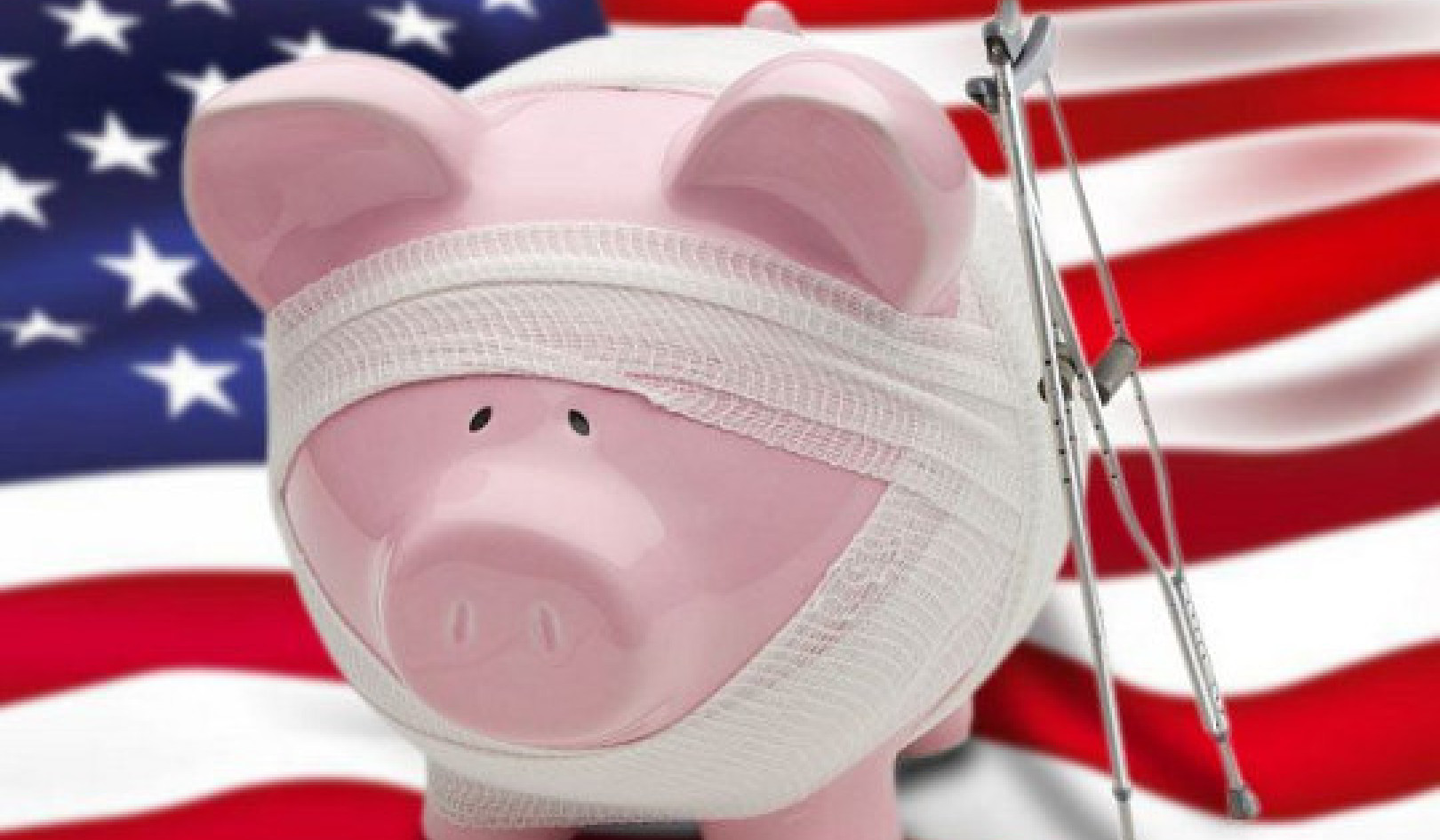
Bergen, Norway. Photo by AsianDream / iStock.
Author George Lakey explains why Scandinavia tops world lists for equality, health, and happiness.
“Look at Scandinavia.” You’ve heard that before. It’s a catchphrase for those of us who would like to live with single-payer health care, well-funded schools, labor laws that allow for work–life balance and parental leave, and tuition-free higher education so that students graduate without debt. Oh, and efficient public transportation, clean streets, low crime—the list goes on. We’ve heard that these marvelous things actually exist in Sweden, Norway, Denmark, Finland, and Iceland—along with prosperity and the freedom conservatives say is threatened when central government runs programs for the health and welfare of its citizens.
The system of universal benefits and services often referred to as “the Nordic Model” is described by George Lakey in his new book, Viking Economics. The title refers not to the plunder practiced by old-school Vikings, but to the bold spirit of 20th century Scandinavians who agitated and organized for rights and services. The expectation that government should secure the well-being of its people is now a Scandinavian consensus, writes Lakey, albeit one that allows for experimentation, debate, protest, and readjustment of policies. It is why modern-day descendants of the Vikings top world lists for equality, health, standard of living, and even happiness.
Lakey, a veteran activist who taught issues in social change at Swarthmore College, brings his expertise to understanding the Nordic way of running a society. Equally valuable is his personal experience. At the age of 21, he met Berit Mathiesen on a Quaker student project, sailed to Norway to marry her, and quickly immersed himself in Norwegian life.
He lived, studied, and worked in the country, and has visited many times over five decades, giving him an ideal vantage point for seeing the Scandinavian system as it has evolved. That deep understanding feeds a narrative of scenes, history, and observations that make Viking Economics accessible and a pleasure to read.
George Lakey talked to YES! about how the Scandinavians “got it right” and why he thinks we could, too.
Valerie Schloredt: Through your experience of living in Norway and having Norwegian family, is there something you notice immediately when you’re there that’s different for people as a result of the system you call “Viking economics”?
George Lakey: People I know there love the easy access to nature. They love to be able to jump on a trolley or a bus and get very quickly into a natural space where they can walk or ski, depending on the season. In Denmark, which is much flatter than Norway, it means that there’s nature within easy distance of bicycling. That is so appreciated by people. And they tend to be healthier, which is great for worker productivity and for the health care system because you have fewer sick people who need treatment.
So the country saves money by not having to invest so much in dealing with illness and has higher productivity because workers are healthier. So just that land-use set of choices has so much benefit. And that’s what I find again and again, that people benefit from smart design.
Schloredt: It seems like we have a lot of anxiety in the United States—worries about paying for health care, when you can afford to have a child, how to pay for child care, and that sort of thing. Do you see ways the Scandinavian system reduces anxiety for its citizens?
Lakey: I do. They do get the highest ratings about the best place to be a mom, and part of that picture is the employer’s obligation to allow nursing moms to take up to two hours per day of paid time off from work so that they can nurse their babies. And it’s very easy to get affordable child care, either at the workplace or, if your workplace doesn’t have it, in your own neighborhood.
Schloredt: When we start talking about these kinds of policies in the United States, one response is anger that people might be entitled to things like subsidized child care or parental leave or workplace nurseries. Could you address the resistance we hear from some Americans at the idea of the government providing things for people?
Lakey: Folks in Scandinavia had to sweat to create the current situation they’re in. In the 1920s and ’30s, there were troops being called out to put the people down who were demanding a change. So the economic elites in those countries really did resist change, and the people had to sweat hard to force change.
So I think it is reasonable to say in a fairly tough way to Americans, “Look, when you earn it through creating mass movements that demand a system like that, you’ll get it as a result of your struggle. But if you don’t struggle, you won’t get it, and it’s pointless to just sit around envying other people who did sweat and got it.”
Schloredt: What about the issue of equality? It seems like in the United States we’re trained to think that you get good things if you deserve them, and those who don’t have a comfortable life somehow don’t deserve one. Do we have latent desires for equality that we can tap into here?
Lakey: It’s in our founding documents, after all! We can look back at times when there has been more equality in the United States, like after World War II, when our society was actually much happier and in many ways a more satisfying place to live than it has been when it’s been more unequal. And our government has been much more functional when we’ve had more equality.
There used to be something called “bipartisan foreign policy,” for example, because the parties knew they had to get along and do the actual work of governing, which is to compromise, and that had to do with the amount of equality we had.
It’s clear now from health studies that people in more equal societies are healthier than people in more unequal societies. Of course, there’s way less crime. So if there’s anybody who’s concerned about crime, they might want to have a more equal society because they have less risk of crime. There are lots of payoffs to equality.
And of course, most inequality is inherited rather than earned. My friend Chuck Collins’ new book, Born on Third Base, is about what it is like for well-off people in this country, who are mostly born on third base. When they get to home plate it’s pretty ridiculous for them to take credit for hitting a home run because they were born on third base.
Schloredt: How do we get from where we are now to where we need to be?
Lakey: Well, for one thing we need to see through the pretense of democracy. As long as we are in denial about that, we’re going to fail in working for change. When we acknowledge who the rulers really are, which is the one percent, then we can get real about change and make big change.
I think that’s what has been going on with climate change. Take solar energy. Solar was getting to be regarded by the national power centers as way too attractive, especially in Hawaii and California, so they’ve stepped in to de-incentivize solar and try to slow it down. Trying to slow renewable energy down is one way to commit suicide, and they’re willing to do that in order to maintain the profits they get from their already huge investments in oil and gas, which continue to be subsidized by the government—which is the government that they control.
We do, sooner or later, need to be able to tackle the power at the center in order to really take charge of our country, and it’s taking charge of our country that would enable us to get what the Scandinavians got.
Schloredt: It’s a big job.
Lakey: Yes, but I think we’re capable of big jobs. That’s a difference that I don’t address in the book. I’ve been asking at bookstore readings where there is a range of ages, “Who has heard in their lives a lot of emphasis on Americans identifying themselves as the ‘can-do people’?” Older people raise their hands, “Oh yeah, we remember that. ‘Give the tough jobs to the Americans. We can do it!’”
Younger people don’t tend to put up their hands. We have a moment when people observe that. Young people are not being encouraged to think of themselves as having a lot of agency. And to think of their country as being able to tackle really tough problems. What’s the purpose of that passivity, I wonder. So we will just be sheep as the one percent leads us.
I’m asking that question over and over, and I’m sobered by the number of people who actually feel weak and powerless with regard to changing our destiny. That is a departure from American history. Once we recognize that, we have to ask ourselves, “Do we really want to render ourselves weak?” Because the easiest way to render yourself weak is to believe yourself to be weak.
Schloredt: So greater equality and a more democratic and responsive government give Scandinavians a better sense of controlling their own destiny?
Lakey: Absolutely. And that is felt on the ground level. I tell a story in the book about my relatives in Norway sitting around talking about economic policy as if they’re running the country. And ... they are!
This article originally appeared on YES! Magazine
About The Author
Valerie Schloredt wrote this article for YES! Magazine. Valerie lives in Seattle, where she edits and writes about climate activism and social justice.
Related Books
at InnerSelf Market and Amazon























